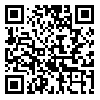BibTeX | RIS | EndNote | Medlars | ProCite | Reference Manager | RefWorks
Send citation to:
URL: http://sjsph.tums.ac.ir/article-1-2-en.html
Background and Aim: The most important single determinant of the quality of life of the elderly is health. Studies have shown that health declines with age. Because of high vulnerablity of the elderly due to many problems, they need particular attention and self-care programs for their health promotion. The objective of this study was to assess the quality of life of elderly clients under coverage of the Southern Tehran Health Center and determine the effects of a self-care program on it.
Materials and Methods: This was a controlled interventional study conducted in 2010-2011. A total of 132 elderly clients (52 in the intervention, and 80 in the control, group) were selected by randomised cluster sampling from 5 Health Care Centers in Southern Tehran. A 3-month educational program was prepared with contents based on books published by the Ministry of Health and Medical Education and implemented. The quality of life was assessed in both groups at the beginning and 2 months after the intervention using a short questionnaire (sf36). Data were collected through a structured interview (demographic characterstics) and analyzed using descriptive and analytical statistical tests.
Results: The mean quality-of-life score of the experimental group increased after education the mean score of physical domain of the quality of life increased from 52.75 in 66.11 and that of the emotional domain from 53.61 to 70.85. The scores of different domains of quality of life of the control subjects did not change significantly.
Conclusion: The findings show that a self-care educational program can have a positive affect on quality of life of the elderly.
Received: 2012/05/25 | Accepted: 2012/10/10 | Published: 2013/08/8
| Rights and permissions | |
 |
This work is licensed under a Creative Commons Attribution-NonCommercial 4.0 International License. |





